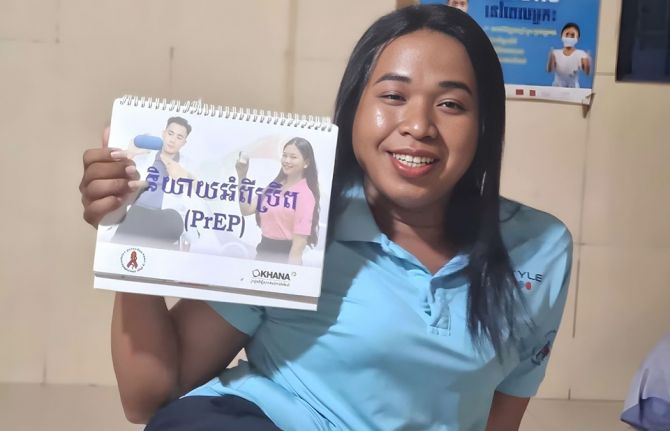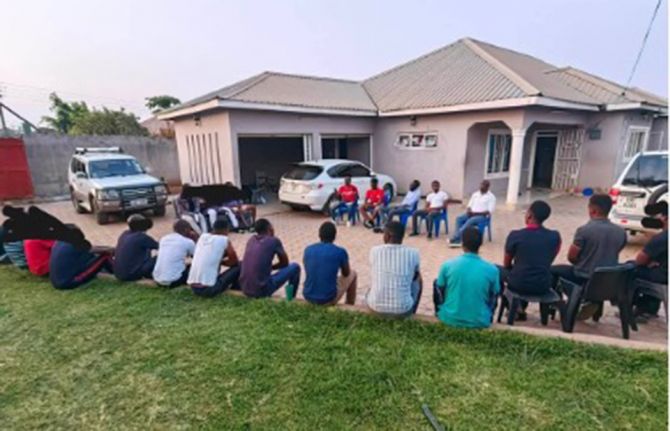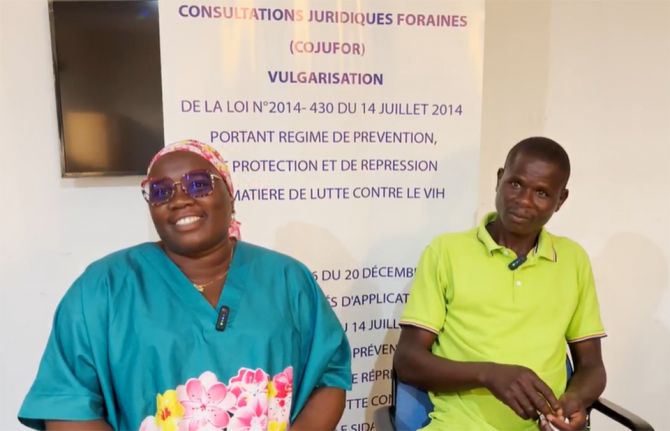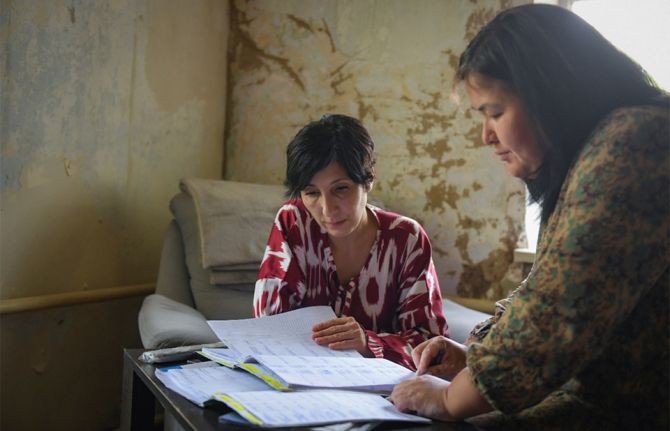
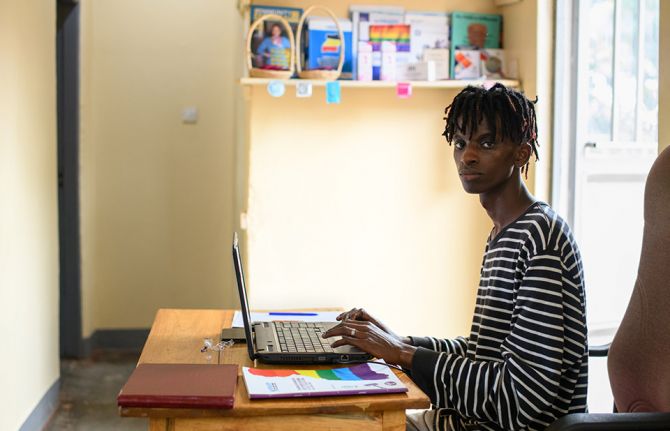
Feature Story
Survey shows that the COVID-19 pandemic increases vulnerability of LGBTI people
10 July 2020
10 July 2020 10 July 2020The opening session of the 2020 International AIDS Conference shared the findings of a rapid online survey demonstrating the increased socioeconomic vulnerability of lesbian, gay, bisexual, transgender and intersex (LGBTI) people due to COVID-19.
UNAIDS, the LGBT+ Foundation and researchers from the Johns Hopkins Bloomberg School of Public Health and other universities around the globe convened a COVID-19 disparities working group. It surveyed more than 20 000 LGBTI people in 138 countries in April and May and found that three quarters (74%) were fully or partially locked down, leading to economic consequences for many.
About 13% of the survey participants have already lost their jobs in the wake of the pandemic and a fifth (21%) are expecting to lose it in the near future. Nearly half the survey participants (47%) faced economic difficulty, with a quarter unable to meet their basic needs, skipping meals or reducing meal sizes.
Of concern, 21% of participants living with HIV reported that they had experienced “interrupted or restricted access” to refills of antiretroviral therapy and 42% of those said they had less than a month’s supply on hand. Worrisome disruptions were also reported for pre-exposure prophylaxis and access to HIV testing. The study also highlights that racial and ethnic minorities consistently have lower access to HIV services.
Erik Lamontagne, Senior Economist at UNAIDS and one of the members of the working group, reported at the conference that the crisis had pushed 1% of respondents to start engaging in sex work and that 2% had to continue to sell sex during the COVID-19 pandemic, risking exposure to the coronavirus. The pandemic has reduced the ability to negotiate safer sex for 13% of respondents, potentially increasing their risk of acquiring HIV. Respondents also reported reduced access to safe injecting equipment and opioid substitution therapy.
“What worries us is that socioeconomic factors, such as limited access to health care, lower income, unemployment and food insecurity, combined with higher anxiety and depression rates, may place some at higher risk of contracting HIV and affect treatment adherence among people living with HIV,” said Mr Lamontagne.
The study shows that COVID-19 increases the vulnerability of groups that are already disproportionately affected by HIV. Solutions and targeted programmes are required from the global community and governments to sustain prevention, testing and treatment services and to help the LGBTI community not only to survive but emerge from the crisis.


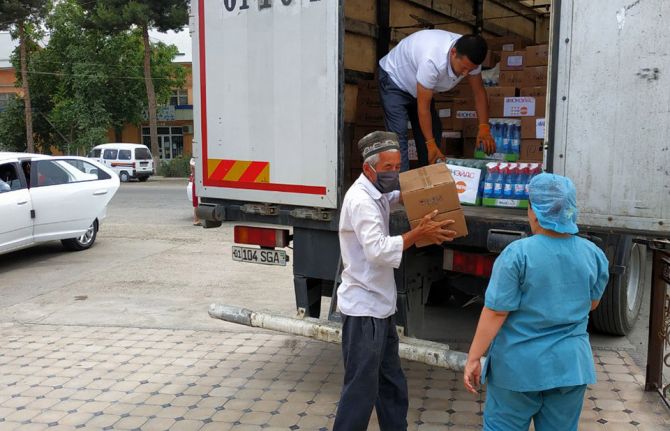
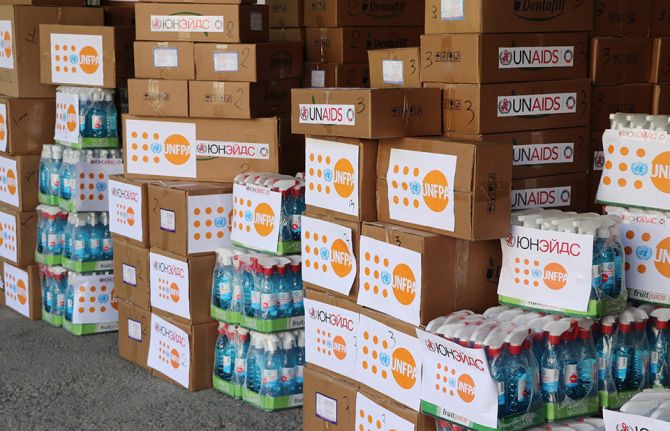
Feature Story
Support for Uzbek mothers living with HIV
08 July 2020
08 July 2020 08 July 2020Shakhnoz Amirova (not her real name) lives in Tashkent, Uzbekistan. She has been taking antiretroviral therapy regularly since 2017, when she discovered that she was living with HIV. She continued the treatment while pregnant with her child, so she did not have to worry about her baby’s health, which was born HIV-free. But the COVID-19 pandemic has changed everything, and the lockdown restrictions severely limited access to medical services.
The immediate anxiety about the possible disruption to her HIV treatment and that of her husband, who is also living with HIV, was allayed by the health-care facility that she attends, the Republican AIDS Center, dispensing a two-month supply of antiretroviral therapy for everyone who needs it.
However, Ms Amirova was pregnant again and worried about the impact that COVID-19 may have on her and her unborn child, since information on how COVID-19 may affect people living with HIV was scarce. She was even unsure whether the coronavirus outbreak would stop her being able to have her baby at the maternity hospital.
“Women living with HIV feel especially vulnerable during pregnancy and childbirth, as fear of virus transmission, stigma and discrimination are added to the fears for the well-being of their baby. Of course, the situation with coronavirus is an additional stress factor. At such a difficult moment, women really need help and support, and we are trying to provide this help to them,” said Evgenia Korotkova, a representative of Ishonch va Khaet, an organization that helps people living with HIV.
The Positive Maternity programme run by Ishonch va Khaet helps women living with HIV who are pregnant or have recently given birth with social support, delivering antiretroviral therapy and baby food and providing medical care. During the COVID-19 outbreak, Ishonch va Khaet and similar organizations are working doubly hard so that people who need help get it as quickly as possible.
Yuldashev Kahramon Haldarovich, the Director of the Republican AIDS Center, noted the special role of nongovernmental organizations during a pandemic. “Community involvement in HIV prevention and support for people living with the virus are very important, especially at such tense moments, when the efforts of all health professionals and doctors are concentrated on fighting another pandemic. We cannot leave people who need HIV services behind; they also need help, and they need it today. The work of volunteers from social organizations is priceless.”
Since keeping patients and medical personnel in maternity hospitals safe from COVID-19 is such a priority, UNAIDS and the United Nations Population Fund have made a donation of a range of personal protective equipment, including masks and gloves, and disinfectant to 21 maternity hospitals in Uzbekistan.
“Protecting medical personnel in maternity hospitals from infection is as important as protecting pregnant women. The country is currently on the way to eliminating mother-to-child transmission of HIV. Preventive measures against COVID-19 are important for supporting the progress made,” said Charos Maksudova, the representative of UNAIDS in Uzbekistan.
Ms Amirova safely gave birth in the maternity hospital, happy that both her and her baby avoided becoming infected by the new coronavirus and that her baby was born HIV-free. “But fear for my children, especially for a newborn, does not leave me for a minute,” said Ms Amirova.
Now back at home, she is receiving help from peer counsellors from the Positive Maternity programme.
Our work
Region/country
Related
 Women, HIV, and war: a triple burden
Women, HIV, and war: a triple burden

12 September 2025
 Displacement and HIV: doubly vulnerable in Ukraine
Displacement and HIV: doubly vulnerable in Ukraine

11 August 2025

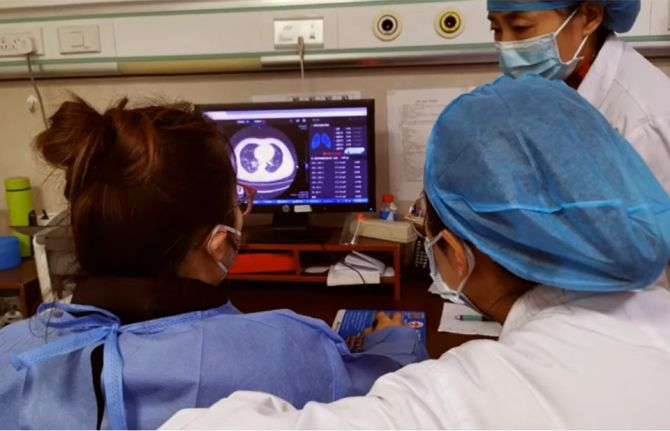
Press Release
UNAIDS Health Innovation Exchange 2020 opens ahead of the International AIDS Conference
01 July 2020 01 July 2020The UNAIDS Health Innovation Exchange’s global event, HIEx2020, will feature health-related innovations from around the world and facilitate discussions around innovation in health
GENEVA, 1 July 2020—The UNAIDS Health Innovation Exchange global event, HIEx2020, has opened, showcasing a virtual marketplace of more than 25 innovations for health from around the world. This year, the event, which is taking place ahead of the 2020 International AIDS Conference, has a special focus on COVID-19.
The innovations presented in the marketplace aim to respond to some of the most critical health challenges faced by countries and communities, particularly in low- and middle-income countries. Innovations range from products to detect counterfeit medicines and illicit substances to digital solutions such as telemedicine platforms that provide remote online medical services, mobile applications to promote the sexual health of young people and COVID-19 diagnostics.
“We need social innovations and to leverage technology to achieve better health outcomes. We need radical game-changers for adolescent girls and young women in sub-Saharan Africa to address persisting inequalities,” said Shannon Hader, Deputy Executive Director, Programme, UNAIDS. “The AIDS response has demonstrated that innovations driven by the passion of communities can transform health-care access and reach the most marginalized.”
One of the featured innovations uses ultraviolet-free LED lighting technology to kill viruses and bacteria, which has recently demonstrated high effectiveness on the new coronavirus that causes COVID-19.
The HIEx2020 programme will run over two days (1 and 2 July) and will feature key leaders in health and innovation. The programme of high-level events includes Lessons from COVID-19: Innovating to Future-Proof our Health Systems, Young People’s Access to Digital Health and Changing Healthcare through Innovations.
Mariya Gabriel, the European Commissioner for Innovation, Research, Culture, Education and Youth, will deliver a keynote address focused on leveraging innovation and leadership for global health. “Innovation must be part of the health-care DNA, leaving no one behind,” said Ms Gabriel. “But no individual continent, country or institution can win this race on its own. It takes a global effort and political commitment.”
HIEx2020 will feature a special spotlight on solar energy for health through a high-level discussion with ministers of health and energy from several countries, which is organized in collaboration with the International Solar Alliance. Primary health facilities in several countries lack reliable power, which not only limits quality of services but also prevents the take-up of digital health tools for scaling up access to health care.
“Solar energy can ensure better availability and quality of health services in areas where there is a challenge of access to energy,” said Upendra Tripathy, the Director-General of the International Solar Alliance. “We should work towards scaling up solar energy as an agent for transforming primary health care in developing countries.”
Innovations for COVID-19
The COVID-19 pandemic has brought to light the crucial importance of ensuring that health systems are resilient and that countries have the necessary technologies and capacities to respond effectively to health crises.
The UNAIDS Health Innovation Exchange has been an early supporter of tracking COVID-19-related innovations. As the COVID-19 pandemic was rapidly spreading in March 2020, UNAIDS and the UNAIDS Health Innovation Exchange teamed up with StartupBlink to launch a dynamic online map of COVID-19-related innovations. The map now has more than 30 000 monthly users and includes details of more than 1000 initiatives from around the world. As part of HIEx2020, the UNAIDS Health Innovation Exchange and StartupBlink will launch an in-depth analysis of the COVID-19 initiatives in an Innovation Ecosystem Report, which will measure and rank cities and countries globally in terms of innovation for COVID-19.
To visit HIEx2020 go to: https://event.healthinnovation.exchange/
UNAIDS Health Innovation Exchange
Launched by UNAIDS in Geneva, Switzerland, in May 2019, the UNAIDS Health Innovation Exchange identifies challenges faced by implementers and connects them with innovations that have high potential for impact, and links with investors to scale up the sustainable solutions. The UNAIDS Health Innovation Exchange builds upon the expertise of political leaders, health experts, technology and science leaders, innovators, investors, accelerators, communities and implementers in countries, and advocates for indigenous solutions, local production and multisectoral partnerships.
Note: inclusion in the UNAIDS Health Innovation Exchange marketplace does not equal endorsement of the innovation by UNAIDS or the UNAIDS Health Innovation Exchange.
UNAIDS
The Joint United Nations Programme on HIV/AIDS (UNAIDS) leads and inspires the world to achieve its shared vision of zero new HIV infections, zero discrimination and zero AIDS-related deaths. UNAIDS unites the efforts of 11 UN organizations—UNHCR, UNICEF, WFP, UNDP, UNFPA, UNODC, UN Women, ILO, UNESCO, WHO and the World Bank—and works closely with global and national partners towards ending the AIDS epidemic by 2030 as part of the Sustainable Development Goals. Learn more at unaids.org and connect with us on Facebook, Twitter, Instagram and YouTube.
Learn more

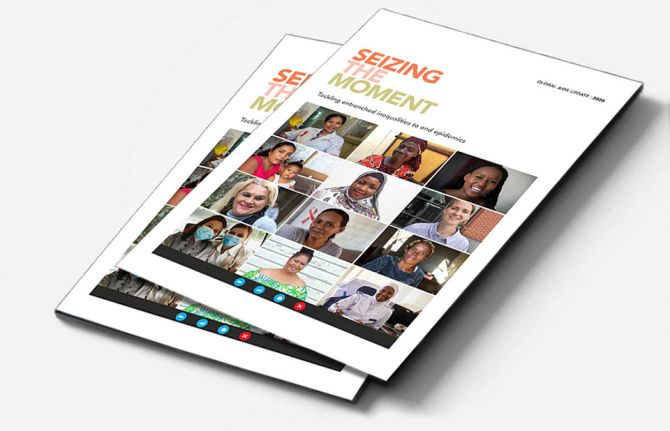
Press Release
UNAIDS report on the global AIDS epidemic shows that 2020 targets will not be met because of deeply unequal success; COVID-19 risks blowing HIV progress way off course
06 July 2020 06 July 2020Missed targets have resulted in 3.5 million more HIV infections and 820 000 more AIDS-related deaths since 2015 than if the world was on track to meet the 2020 targets. In addition, the response could be set back further, by 10 years or more, if the COVID-19 pandemic results in severe disruptions to HIV services.
GENEVA, 6 July 2020—A new report by UNAIDS shows remarkable, but highly unequal, progress, notably in expanding access to antiretroviral therapy. Because the achievements have not been shared equally within and between countries, the global HIV targets set for 2020 will not be reached. The report, Seizing the moment, warns that even the gains made could be lost and progress further stalled if we fail to act. It highlights just how urgent it is for countries to double down and act with greater urgency to reach the millions still left behind.
“Every day in the next decade decisive action is needed to get the world back on track to end the AIDS epidemic by 2030,” said Winnie Byanyima, the Executive Director of UNAIDS. “Millions of lives have been saved, particularly the lives of women in Africa. The progress made by many needs to be shared by all communities in all countries. Stigma and discrimination and widespread inequalities are major barriers to ending AIDS. Countries need to listen to the evidence and step up to their human rights responsibilities.”
Fourteen countries have achieved the 90–90–90 HIV treatment targets (90% of people living with HIV know their HIV status, of whom 90% are on antiretroviral treatment and of whom 90% are virally supressed), including Eswatini, which has one of the highest HIV prevalence rates in the world, at 27% in 2019, and which has now surpassed the targets to achieve 95–95–95.
Millions of lives and new infections have been saved by the scale-up of antiretroviral therapy. However, 690 000 people died of AIDS-related illnesses last year and 12.6 million of the 38 million people living with HIV were not accessing the life-saving treatment.
“We cannot rest on our successes, nor be discouraged by setbacks. We must ensure that no one is left behind. We must close the gaps. We are aiming for 100–100–100,” said Ambrose Dlamini, the Prime Minister of Eswatini.
The world is far behind in preventing new HIV infections. Some 1.7 million people were newly infected with the virus, more than three times the global target. There has been progress in eastern and southern Africa, where new HIV infections have reduced by 38% since 2010. This is in stark contrast to eastern Europe and central Asia, which has seen a staggering 72% rise in new HIV infections since 2010. New HIV infections have also risen in the Middle East and North Africa, by 22%, and by 21% in Latin America.
Seizing the moment shows unequal progress, with too many vulnerable people and populations left behind. Around 62% of new HIV infections occurred among key populations and their sexual partners, including gay men and other men who have sex with men, sex workers, people who inject drugs and people in prison, despite them constituting a very small proportion of the general population.
Stigma and discrimination, together with other social inequalities and exclusion, are proving to be key barriers. Marginalized populations who fear judgement, violence or arrest struggle to access sexual and reproductive health services, especially those related to contraception and HIV prevention. Stigma against people living with HIV is still commonplace. At least 82 countries criminalize some form of HIV transmission, exposure or non-disclosure, sex work is criminalized in at least 103 countries and at least 108 countries criminalize the consumption or possession of drugs for personal use.
Women and girls in sub-Saharan Africa continue to be the most affected and accounted for 59% of all new HIV infections in the region in 2019, with 4500 adolescent girls and young women between 15 and 24 years old becoming infected with HIV every week. Young women accounted for 24% of new HIV infections in 2019, despite making up only 10% of the population in sub-Saharan Africa.
However, where HIV services are comprehensively provided, HIV transmission levels are reduced significantly. In Eswatini, Lesotho and South Africa, a high coverage of combination prevention options, including social and economic support for young women and high levels of treatment coverage and viral suppression for previously unreached populations, have narrowed inequality gaps and driven down the incidence of new HIV infections.
The COVID-19 pandemic has seriously impacted the AIDS response and could disrupt it more. A six-month complete disruption in HIV treatment could cause more than 500 000 additional deaths in sub-Saharan Africa over the next year (2020–2021), bringing the region back to 2008 AIDS mortality levels. Even a 20% disruption could cause an additional 110 000 deaths.
“Those of us who survived HIV and fought for life and access to treatment and care cannot afford losing the gains that took so much effort to win. In some Latin American countries we are seeing how HIV resources, medicines, medical staff and equipment are being moved to the fight against COVID-19,” said Gracia Violeta Ross, President of the Bolivian Network of People Living with HIV. “Some good lessons and practices of the HIV response, such as meaningful participation and accountability, are being ignored. We will not allow HIV to be left behind.”
To fight the colliding epidemics of HIV and COVID-19, UNAIDS and partners are leading a global call for a People’s Vaccine for COVID-19, which has been signed by more than 150 world leaders and experts demanding that all vaccines, treatments and tests be patent-free, mass produced and distributed fairly and free for all.
UNAIDS is also urging countries to increase investments in both diseases. In 2019, funding for HIV fell by 7% from 2017, to US$ 18.6 billion. This setback means that funding is 30% short of the US$ 26.2 billion needed to effectively respond to HIV in 2020.
“We cannot have poor countries at the back of the queue. It should not depend on the money in your pocket or the colour of your skin to be protected against these deadly viruses,” said Ms Byanyima. “We cannot take money from one disease to treat another. Both HIV and COVID-19 must be fully funded if we are to avoid massive loss of life.”
UNAIDS
The Joint United Nations Programme on HIV/AIDS (UNAIDS) leads and inspires the world to achieve its shared vision of zero new HIV infections, zero discrimination and zero AIDS-related deaths. UNAIDS unites the efforts of 11 UN organizations—UNHCR, UNICEF, WFP, UNDP, UNFPA, UNODC, UN Women, ILO, UNESCO, WHO and the World Bank—and works closely with global and national partners towards ending the AIDS epidemic by 2030 as part of the Sustainable Development Goals. Learn more at unaids.org and connect with us on Facebook, Twitter, Instagram and YouTube.
Contact
UNAIDS GenevaSophie Barton-Knott
tel. +41 22 791 1697 / +41 79 514 6896
bartonknotts@unaids.org
UNAIDS Media
tel. +41 22 791 4237
communications@unaids.org
Press centre
Download the printable version (PDF)

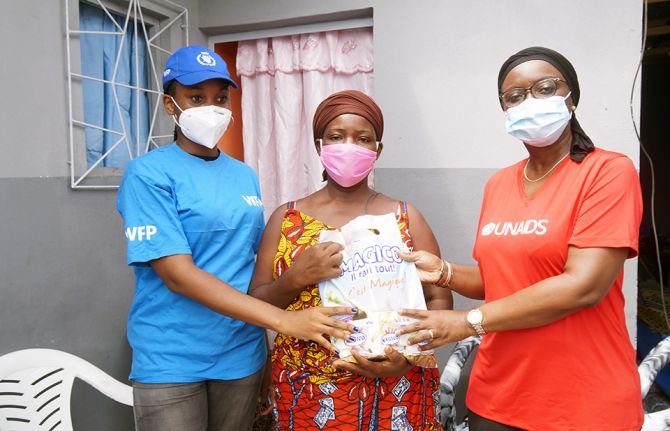
Feature Story
Providing support to COVID-19-hit households in Côte d’Ivoire
01 July 2020
01 July 2020 01 July 2020Thousands of households have been helped in Abidjan, Côte d’Ivoire, through a joint initiative to reach vulnerable households with money for nutrition and food security and basic health kits during the COVID-19 pandemic.
Restrictions on movement imposed to stop the spread of the new coronavirus in Côte d’Ivoire have had a significant impact on the ability of people to earn a living, resulting in an increasing danger of hunger. For people living with HIV, malnutrition and food insecurity reduce HIV treatment adherence, impacting their health and increasing HIV transmission, since stopping treatment can increase a person’s viral load, which increases the chance of passing the virus on. Food insecurity can also increase HIV risk behaviours, potentially putting people at increased risk of acquiring HIV.
The partnership between the World Food Programme, UNAIDS and the Magic System Foundation—a nongovernmental organization that works in the fields of education, health, the environment and culture—allows for a cash transfer of 51 000 central African CFA francs (around US$ 89) per household to cover food needs for two months, distributes hygiene kits and protective equipment to limit the transmission of COVID-19 and gives advice on nutrition.
“The cash transfer allowed me to buy my medicine for three months and to stock up on rice for my family. It gave me the strength to live and smile again,” said one of the recipients.
The priority focus of the campaign are female-headed households and households with pregnant and breastfeeding women, young children, the elderly, people with disabilities and people living with HIV.
“UNAIDS and the Ivorian Network of People Living with HIV are working with various partners—mayors, nongovernmental organizations, the Red Cross, mosques, churches, community leaders, neighbourhood leaders and traditional chiefs—to facilitate access to especially vulnerable people living with HIV,” said Brigitte Quenum, the UNAIDS Country Director for Côte d’Ivoire.
“The health crisis has forced some households to adopt irreversible food strategies, such as selling assets or borrowing money to meet their food needs. Cash-based food aid helps build the resilience of vulnerable households and preserve their livelihoods. The cash transfer provides the opportunity to have a diversified and balanced diet for good health, while leaving recipients with a choice,” said Adeyinka Badejo, the World Food Programme Representative in Côte d’Ivoire.
A further round of assistance for vulnerable households, especially households containing members of key populations or people living with HIV, will take place soon. The second round will draw on a rapid assessment of the needs of people living with HIV during the COVID-19 pandemic, which was carried out by the network of people living with HIV with the support of UNAIDS, and on the lessons learned from the first round of assistance.
Our work
Region/country

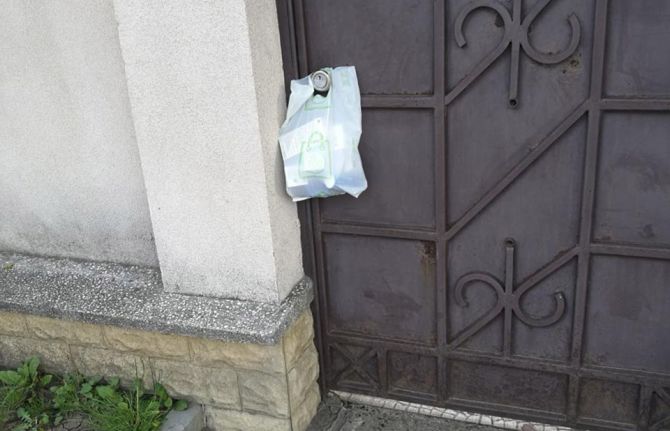
Feature Story
Delivery of PrEP at home in the Republic of Moldova
30 June 2020
30 June 2020 30 June 2020Mihai Ceban (not his real name) has been locked down at home since 17 March, when a state of emergency was declared in the Republic of Moldova in response to COVID-19. He is an information technology specialist, so working from home has not disrupted his daily routine too much. His was worried, however, by his inability to go out to get his supply of HIV pre-exposure prophylaxis (PrEP). He has been taking PrEP to prevent becoming infected with HIV since September 2019. Although he has a partner, he says taking PrEP makes him feel safer. “You can’t fully trust your partner,” he said.
During the state of emergency, restrictions imposed by the authorities and the fear of becoming infected with COVID-19 limited his social contacts to a maximum of two or three people. However, his partner continued to lead an active social life, which increased his risk of HIV infection.
"The fear of COVID-19 was enhanced by the fear of getting infected with HIV. That's why, when I saw I was running out of my pills, I started worrying. I wondered what I would do if no one was working? How do I protect myself? The response came from the GENDERDOC-M Information Center, which delivered my PrEP at home. And the fact that it was delivered to me during the pandemic means that my right to health was respected. It’s my right to have an active protected sex life during the pandemic. And the delivery of PrEP services at home has brought psychological relief and reduced the anxiety of becoming infected with HIV,” Mr Ceban said.
Mr Ceban is not the only beneficiary of the PrEP deliveries. Alexandru Goja, a health programme consultant at the GENDERDOC-M Information Center, said that during the pandemic more than 90 people received PrEP deliveries at home.
“At the beginning of the pandemic, everyone went into a kind of panic. Some people on PrEP discontinued taking it, but most wanted to continue. For them, we went out, into the parks, in front of their apartments blocks, where we tested them for HIV and delivered their medicine. During quarantine, people from key populations avoided going to medical institutions to pick up their medicines, trying to prevent the risk of becoming infected with COVID-19. The support provided by nongovernmental organizations helps them to exercise their right to health,” said Mr Goja.
Angela Nagît, an infectious disease specialist at the Hospital of Dermatology and Communicable Diseases, agrees with him. During the pandemic, she carried out consultations and prescribed PrEP remotely. It is very important that once enrolled on PrEP, the person should stick to it, she said.
“In the Republic of Moldova, HIV infection continues to be a major public health problem with a great medical, social and economic impact. Around half of the people who are estimated to be living with HIV don’t know their status. Unprotected sexual contact is one of the risk factors for HIV transmission. PrEP is a way to prevent infection, thus ensuring the right to health, especially for those from the key affected groups,” she said.
Our work
Region/country
Related

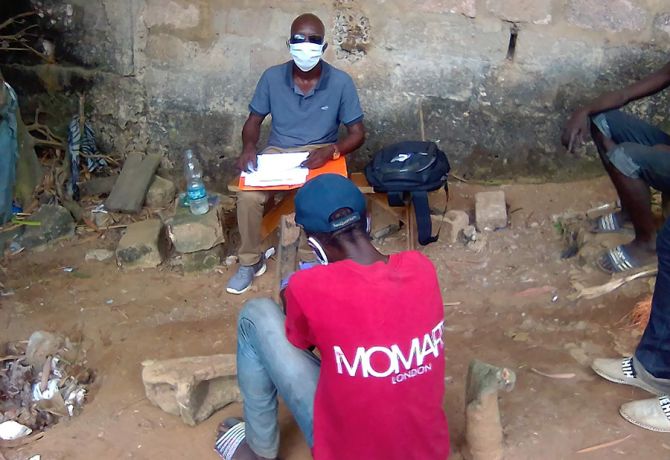
Feature Story
Harm reduction continues for people who use drugs during COVID-19 in Côte d’Ivoire
26 June 2020
26 June 2020 26 June 2020It’s 10 in the morning in Abidjan, Côte d’Ivoire.
Like every morning, Arouna Bakari (not his real name), mask on his face, washes his hands before entering a “smoking room”, as people who use drugs call the open drug-taking places in Abidjan. He checks that the hand washing sink installed in front of the smoking room is working properly. He can now start his work and distribute prevention equipment against COVID-19 to the people who gather there.
Mr Bakari works for Parole Autour de la Sante (PAS), a community-led organization made up of people who use drugs and former people who use drugs, their relatives and social scientists. It operates the first “therapeutic community”, a mixed residential programme for people who use drugs, in western Africa.
Created in Côte d’Ivoire in 2016, PAS promotes the health of people who use drugs through harm reduction and services for HIV, tuberculosis, sexually transmitted infections and hepatitis. Since October 2019, thanks to funding from OSIWA (the Open Society for West Africa), PAS has strengthened its activities, with a focus on the respect of the human rights of people who use drugs—still a highly stigmatized and discriminated against community—and their access to health services. This is why Mr Bakari, in addition to his work in the smoking rooms, also trains health workers, journalists and the security forces.
There have been harm reduction programmes in Côte d’Ivoire for some years now. Community organizations have been set up and work with the national AIDS programme, the national institutions in charge of drug policy and the international nongovernmental organization Médecins du Monde.
The COVID-19 pandemic and the restrictions on movement imposed to stop it had the initial effect of freezing PAS’ work. But very quickly the commitment to continue services regained momentum at PAS.
“People who use drugs noticed that there were no associations or nongovernmental organizations out there in the field despite the fact that people who use drugs were still grouped together in places where drugs are consumed and they still shared equipment (crack pipes, joints, cigarettes, syringes, needles), with the risk of infection with HIV, hepatitis and tuberculosis. With the addition of COVID-19, people who use drugs were now also without access to reliable information and prevention equipment to fight this new health challenge,” said Jerome Evanno, a founding member of PAS.
Therefore, PAS decided to collect and distribute COVID-19 prevention materials and to continue its harm reduction work. PAS’ workers were trained in the prevention of COVID-19 and PAS produced a video clip in nouchi, the Ivorian slang that is the language of communication in the smoking rooms, on the importance of correct hand washing.
Community research was conducted on the perceptions of people who use drugs in the context of COVID-19 in order to understand the unique fears and needs in the face of the new coronavirus. The results and recommendations of the survey have been disseminated to partners in order that they can advocate and adapt their programmes in accordance with the expectations and needs of people who use drugs.
In order to reduce the risk of outbreaks of COVID-19 in prisons, PAS also has been advocating for the release of prisoners and distributing coronavirus prevention materials to inmates at the infirmary of the Abidjan prison.
Our work
Region/country
Related


Feature Story
UNAIDS supporting people stranded in Egypt to access HIV treatment
29 June 2020
29 June 2020 29 June 2020Hundreds of thousands of people around the world have been stranded abroad due to the bans on flights and border closures imposed to stop COVID-19. As elsewhere, thousands of non-nationals have been stranded in Egypt indefinitely.
Travel restrictions have had many repercussions on the daily lives of non-nationals, putting significant economic pressure on them and potentially putting their well-being at risk.
The UNAIDS Country Office for Egypt has been working on COVID-19 from the start of the pandemic in the country, establishing a direct line of communication with the National AIDS Program and working with it to ensure the continuation of HIV treatment by everyone on it and to help non-nationals in Egypt to get supplies of antiretroviral therapy.
Sophia Bianchi (not her real name) is an Italian tourist stranded in Sharm El Sheikh. “I ordered my antiretroviral treatment in late April from Italy via a courier service. Unfortunately, the shipment was stuck at the airport customs in Cairo for weeks. I contacted UNAIDS and they have been very helpful, following up daily with the Egyptian Ministry of Health and Population to get approval for releasing the shipment and checking on me and my health. They kept pushing through the Eid holidays and it all got resolved in two weeks. It was a stressful time but now I am relieved,” she said.
Antiretroviral therapy is available in Egypt free of charge to all nationals and registered refugees. However, as there is no community-based dispensing, nor private market purchase of antiretroviral medicines, gaps remain in ensuring that non-nationals can access treatment. For this reason, UNAIDS’ work during the COVID-19 pandemic has been essential in bridging the gaps.
There are strict rules on the dispensing of antiretroviral therapy in Egypt—only close family members are able to collect it from the dispensing centre. For Fatima Ahmed (not her real name), a refugee from Yemen who because of chronic illnesses that put her at higher risk from COVID-19 cannot leave her house, this was a significant barrier to accessing her HIV treatment. UNAIDS got in contact with the Egyptian Ministry of Health and Population to get an exceptional approval to dispense her medicine through a nongovernmental organization.
“I have not left the house for more than three months. My family has not been able to support me financially, so I was left without revenue. Thanks to the support of the National AIDS Program and MENA Rosa, a nongovernmental organization, peer supporters have delivered three months of antiretroviral treatment to my doorstep,” said Ms Ahmed.
However, much still remains to be done in reaching out to the most in need in Egypt. UNAIDS in Egypt has been advocating for the right to health and universal health coverage for everyone and is working in partnership with the Egyptian Ministry of Health and Population to ensure treatment for all nationals and non-nationals in the country.
“We believe in the absolute right of everyone to have access to their basic right to health. Ensuring access to antiretroviral therapy during these exceptional times is therefore our upmost priority. We are working relentlessly with our governmental and nongovernmental partners to build long-term policies to ensure treatment and care services for people living with HIV during times of emergency,” said Walid Kamal, the UNAIDS Country Director for Egypt.
Our work
Region/country

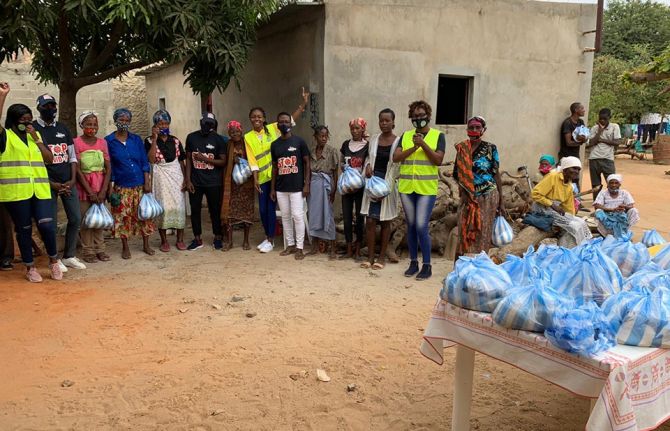
Feature Story
UNAIDS helps response to food insecurity during COVID-19 outbreak in Angola
19 June 2020
19 June 2020 19 June 2020“Angola has a long history of epidemic outbreaks,” said Michel Kouakou, UNAIDS Country Director for Angola. “From cholera, malaria, polio and yellow fever, the country is well prepared and has competent people to deal with outbreaks, including health-care workers,” he said.
As a result, the President of Angola, João Lourenço, took immediate steps early in the COVID-19 outbreak, including a nationwide lockdown, closure of the border and cessation of international flights.
While this had the effect of keeping new COVID-19 cases low, it caused many people to lose their livelihoods, especially people who work in the informal sector.
To respond to the food insecurity that this caused, especially among people living with HIV, the UNAIDS Country Office for Angola leveraged its partnerships to reach thousands of people in Luanda, the capital city of Angola, with food baskets.
Under the auspices of her Free to Shine campaign, which focuses on the elimination of mother-to-child transmission of HIV in Angola, the First Lady of Angola, Ana Afonso Dias Lourenço, in partnership with the Saham Angola Insurance Company, the Association of HIV-Positive People and UNAIDS, distributed 1000 food baskets to people living with HIV, 500 of which were given to pregnant women living with HIV.
As the lockdown proceeded, Yola Semedo, a popular Angolan singer and songwriter and a UNAIDS National Goodwill Ambassador, arranged a virtual concert, which was televised on national television. She raised funds for an additional 14 000 food baskets, which she distributed in Luanda and Benguela provinces, including 500 food baskets for people living with HIV in Luanda.
“Our people are vulnerable due to COVID-19 and at this time I feel very happy to be a daughter of this land. It is at this time that we realize that ours are here with us,” said Ms Semedo.
A long-standing civil society partner of UNAIDS, the Angola Network of AIDS Service Organizations, which supports people and families living with HIV, has distributed 1500 food baskets, and the numbers are growing as more are distributed every day.
The Association of Policewomen in Angola also joined the movement and donated 120 food baskets to the faith-based organization Associação de Solidariedade Cristã e Ajuda Mútua in order for them to distribute the packs to female sex workers, who have experienced a loss of income owing to the COVID-19 pandemic.
“While many countries in the region have used lockdown as an excuse to further criminalize key populations, including sex workers, this action has shown that solidarity is key during this time,” said Mr Kouakou.
Our work
Region/country
Related

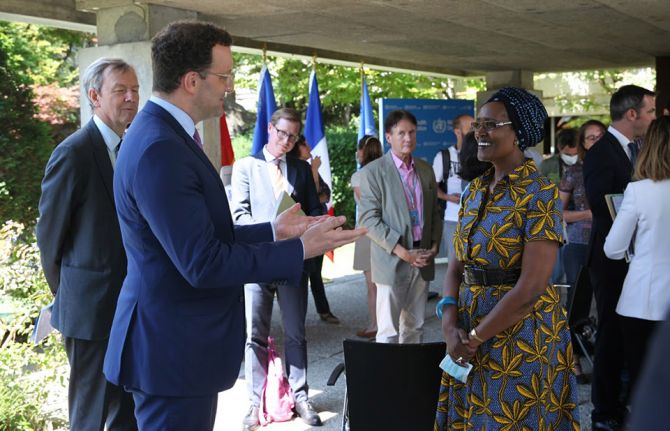
Press Release
Germany ramps up its contribution to the HIV response with an extra €20 million to UNAIDS
25 June 2020 25 June 2020GENEVA, 25 June 2020—The Government of Germany has announced that, in addition to its annual core contribution of €5 million, it will contribute a further €20 million to UNAIDS in 2020 to strengthen the response to HIV during the COVID-19 pandemic. The Federal Minister of Health, Jens Spahn, made the announcement during a meeting with Winnie Byanyima, the UNAIDS Executive Director, in Geneva, Switzerland, during the 46th meeting of the UNAIDS Programme Coordinating Board.
“We commend UNAIDS’ work in the fight against COVID-19, which focuses on engaging communities, ensuring that vulnerable and key populations are reached with essential health services, including HIV services, protecting basic rights and mitigating the socioeconomic impacts of the epidemic,” said Mr Spahn. “With the additional funds, we encourage UNAIDS to continue this important work alongside the World Health Organization and other global health partners.”
The Government of Germany and parliamentarians, civil society and other partners in Germany have long shown commitment to the global HIV response and to global health and health security, with Germany pledging US$ 1 billion to the Global Fund to Fight AIDS, Tuberculosis and Malaria at its last replenishment. A valued partner of UNAIDS, the Government of Germany is firmly committed to ending AIDS as a public health threat by 2030 and has invested significant resources to ensure that no one is left behind.
“UNAIDS welcomes this show of support by Germany. It is an encouraging recognition of the work undertaken by UNAIDS with countries and partners to respond to HIV during the COVID-19 pandemic. It is also a crucial recognition of the lessons and experiences gained over the past decades in the HIV response, which are now being used in the fight against COVID-19,” said Ms Byanyima. “I call upon others to follow Germany’s lead and continue to invest in the global HIV response.”
German’s increased support is a critical investment in saving lives and protecting the dignity of people living with or at risk of HIV. At a time when the world faces the colliding pandemics of HIV and COVID-19, Germany is continuing to demonstrate the need for shared responsibility and global solidarity. Modelling suggests that an unmitigated six-month interruption of HIV services due to COVID-19 could double AIDS-related deaths in sub-Saharan Africa, setting the clock on AIDS-related deaths in the region back to 2008, and could increase new paediatric HIV infections by up to 162%.
UNAIDS
The Joint United Nations Programme on HIV/AIDS (UNAIDS) leads and inspires the world to achieve its shared vision of zero new HIV infections, zero discrimination and zero AIDS-related deaths. UNAIDS unites the efforts of 11 UN organizations—UNHCR, UNICEF, WFP, UNDP, UNFPA, UNODC, UN Women, ILO, UNESCO, WHO and the World Bank—and works closely with global and national partners towards ending the AIDS epidemic by 2030 as part of the Sustainable Development Goals. Learn more at unaids.org and connect with us on Facebook, Twitter, Instagram and YouTube.
Contact
UNAIDS GenevaSophie Barton-Knott
tel. +41 79 514 68 96
bartonknotts@unaids.org
UNAIDS Media
tel. +41 22 791 4237
communications@unaids.org
Our work
Press centre
Download the printable version (PDF)

